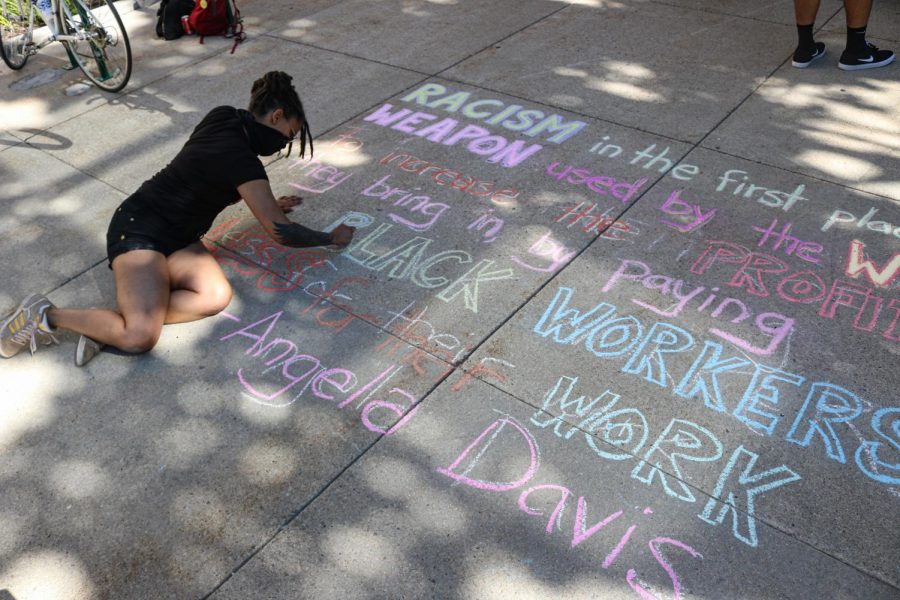ASUU Declares Racism a Public Health Crisis at the U, Sets Precedent for the State
Attendee writes an Angela Davis quote in chalk at Washington Square Park for the Juneteenth celebration in Salt Lake City on June 19, 2020. (Photo by Ivana Martinez | Daily Utah Chronicle)
June 27, 2020
While the Salt Lake City streets have been filled with protesters for a month straight, students at the University of Utah have been working to acknowledge their demands and address systemic racism in their own way. Joint Resolution 1, which passed unanimously in both the assembly and the senate of the Associated Students of the University of Utah, declares racism a public health crisis at the school.
The resolution, written by students at the U’s school of medicine, opens up funds that are already set aside for public health crises to be used to combat systemic racism, especially in healthcare.
Lilly Kanishka and Olaoluwa Omotowa, both U medical students, came together with other Black, Indigenous and students of color to write the language of this joint resolution. They approached Kaitlin McLean, ex officio of ASUU and medical student, to help them solidify the format and make it fit the qualifications of a joint resolution.
In the ASUU general assembly meeting on June 23, the joint resolution passed unanimously. There was a motion to edit the joint resolution to make the language clearer; the motion was soon rescinded when the authors of the bill explained that they wanted to maintain the original, intentional language of the BIPOC students who had written it.
In the ASUU senate meeting on June 25, authors of the joint resolution and BIPOC ASUU representatives expressed their personal experiences with discrimination in healthcare and why they deemed the joint resolution important.
“Racism has always been seen affecting the public health of society; viewed as a social determinant of health, it affects the quality of care and health outcome of patients. It is something I’ve experienced myself as a POC in my pace of work here at the university both on campus and in the hospital system,” McLean read on behalf of Kanishka.
Kanishka continued on to write about the various microaggressions that take place in the healthcare system.
“I have seen the lack of hiring of people of color in my workplace. Because their ‘foreign name and international status means they don’t know English well so how could they possibly help?’ Other discrimination within the healthcare system with patients experiencing homelessness viewed upon negatively as they are a ‘cost for the hospital’ and are on medicare or Medicaid and thus given a poorer quality of care,” Kanishka wrote.
Masters public health student and ASUU senator from the school of medicine Maria Velasco spoke of the disproportionate death rates of minority individuals, not because these health issues are more prevalent among their communities but because they are not given adequate care due to racism in the healthcare system.
“Most of the public health issues are for health disparities and most of those disparities are results of racism. Health workers are not being culturally competent or language barriers for people and not having follow-ups for their treatment,” Velasco said.
The authors of the bill said that they were impacted by the murder of George Floyd and wanted to combine their efforts to make a change that would combat racism in healthcare in a systemic way.
“Shortly after we all witnessed George Floyd being executed on camera, my class decided to create an op-ed and we turned this into a joint resolution to get the state of Utah to try to get racism declared as a public health crisis. The overall vision of this is a declaration coming from our elected officials of the state of Utah to say there is something going on in the state of Utah and we have the opportunity to make a change,” Omotowa said.
After a few questions and no debate, the Senate passed the joint resolution unanimously. McLean’s goal is to emphasize the student and healthcare support of this bill when the authors take it to various faculty and deans to hopefully make systemic change at the U.
“In the future, we would take it to staff council, the deans, the academic senate, and then potentially the alumni association. Even if the University of Utah doesn’t take an official stance in support, we can take this to the legislature and the governor and say that we represent the elected representatives of all the major stakeholders on campus, including hospital employees,” McLean said.









Pepe • Jul 3, 2020 at 12:15 pm
Disparities are not discrimination. If they exist, show it with statistical evidence. Also anecdotal evidence on what the person sees in hiring practices and such are just that, show evidence that people are discriminated against with facts. We need to stand up for the constitution of America and combat police brutality which is what’s at issue here. Racism, the prejudice And discrimination against another person based on race has been banned systemically since the civil rights act. There is no other definition of racism, a system that has disparate outcomes is a system in which freedom exists and the different choices that people make play a role in the disparities.. Equal outcome = slavery, down with socialism and the neomarxism disguised under black lives matter, diversity, inclusion and equity. Let’s talk about the real issues without the socialist neo-Marxist tinge.
Leah Joyner • Jul 1, 2020 at 4:26 pm
Where we can find a copy of this resolution?